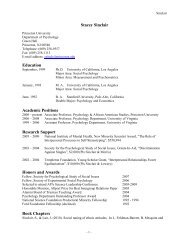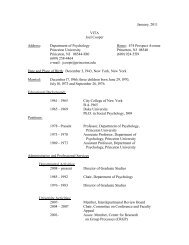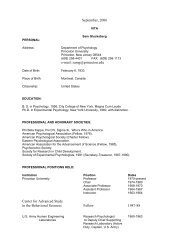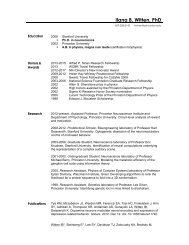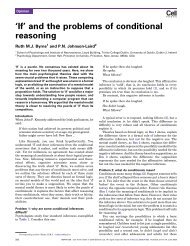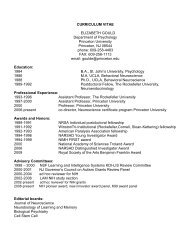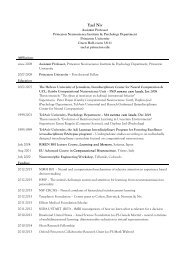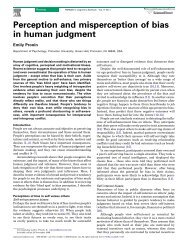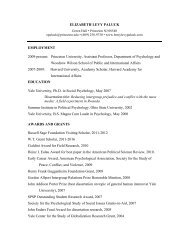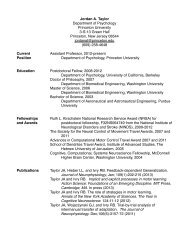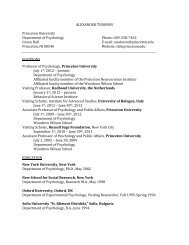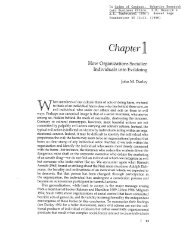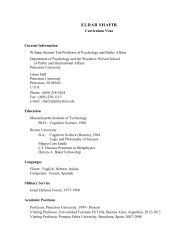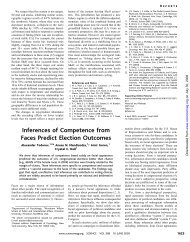Kenneth Andrew Norman - Department of Psychology - Princeton ...
Kenneth Andrew Norman - Department of Psychology - Princeton ...
Kenneth Andrew Norman - Department of Psychology - Princeton ...
You also want an ePaper? Increase the reach of your titles
YUMPU automatically turns print PDFs into web optimized ePapers that Google loves.
<strong>Kenneth</strong> <strong>Norman</strong> August 24, 2013 page 15 <strong>of</strong> 18<br />
Society, Chapel Hill, NC, October, 2009<br />
Member, Computational Cognitive Neuroscience Conference organizing committee, January<br />
2008 – present<br />
Member, Context and Episodic Memory Symposium organizing committee, October 2008 –<br />
present<br />
Panelist, NIH special emphasis grant review panels BBBP-E (January 2011), BBBP-E (November<br />
2010), BBBP-D (June 2009), BBBP-L (March 2009)<br />
Member, NIH ZRG1 F02A (20) study section (Neuroscience predoctoral & postdoctoral<br />
fellowships), March 2004 – June 2004<br />
Co-organizer (with Michael Kahana), Second Annual Episodic Memory Symposium, New<br />
Orleans, LA, November 2003<br />
Co-organizer (with Michael Kahana), First Annual Episodic Memory Symposium, Orlando, FL,<br />
November 2002<br />
Consultant on NIH R01 grant, Tim Curran PI, “ERP studies <strong>of</strong> dual processes in human<br />
recognition memory”, January 2002 – December 2006<br />
Co-organizer (with Ken Malmberg), Symposium on New Approaches to Dual-Process Models <strong>of</strong><br />
Recognition, Annual Interdisciplinary Conference, Jackson, WY, January 2001<br />
Teaching<br />
Spring 2004-05, Fall 2005-06, Fall 2007-08, Spring 2009-10, Fall 2011-12: PSY 306, “Memory<br />
and Cognition”<br />
This course provides an integrative treatment <strong>of</strong> learning and memory in humans and animals.<br />
We explore working memory (our ability to actively maintain thoughts in the face <strong>of</strong> distraction)<br />
and episodic memory (our ability to rapidly memorize specific details so we can recall them later),<br />
as well as more incremental forms <strong>of</strong> learning. In studying these topics, we consider the<br />
behavioral paradigms used to extract learning and memory data, as well as techniques from<br />
cognitive neuroscience (e.g., neuroimaging, lesion studies, computational modeling) that shed<br />
light on how the brain gives rise to learning and memory.<br />
Fall 2003-04: FRS 165, “Memory Distortion and Forgetting”<br />
This freshman seminar course provides an introduction to the neural basis <strong>of</strong> memory, and then<br />
applies this knowledge to the (closely related) problems <strong>of</strong> why we fail to remember things that<br />
happened and why we sometimes remember things that did not happen.<br />
Spring 2002-03, Spring 2003-04, Spring 2005-06, Spring 2007-08, Spring 2008-09, Spring 2011-<br />
12: PSY 330, “Introduction to Connectionist Models: Bridging Between Brain and Mind”<br />
This course provides an introduction to the use <strong>of</strong> connectionist models (also known as neural<br />
network or parallel distributed processing models) as a tool for exploring how psychological<br />
functions are implemented in the brain. The goal <strong>of</strong> this course is to give students the theoretical<br />
background and practical skills that they will need to pursue further independent research in<br />
computational modeling <strong>of</strong> cognition.



